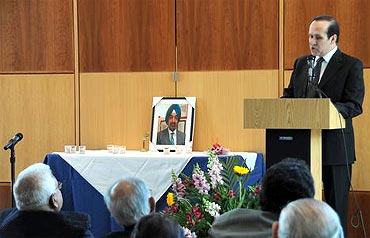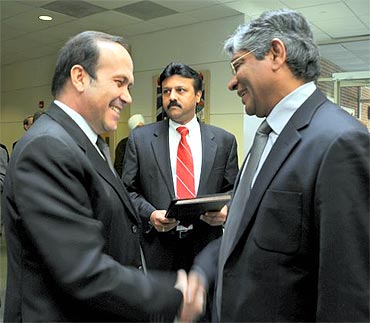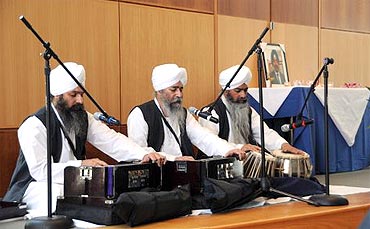
Aziz Hanifa on one of India's finest diplomats, who succumbed to cancer at age 59.
Several hundred members of the Indian-American community in the Washington DC area packed the synagogue at the Julia Bindman Suburban Center in Potomac, Maryland, to pay tribute to the late Ambassador Raminder Singh Jassal at a memorial service in his honour on March 27, organised by the National Council of Asian Indian Associations and the American Jewish Committee.
Jassal succumbed to cancer in Ankara, where he was serving as India's ambassador to Turkey on March 11. In a distinguished diplomatic career spanning nearly four decades, Jassal served as India's ambassador to Israel, and deputy chief of mission in Washington. He was India's public face as spokesman of the external affairs ministry during India's 1999 military confrontation with Pakistan in Kargil.
During his stint in DC, Jassal played an important role in the transformation of United States-India relations, including the negotiations that led to the signing of the US-India civilian nuclear deal.
At the memorial service were senior diplomats from the Indian, Turkish and Israeli embassies and also the US Department of State.
Turkey's ambassador to the US, Namil Tan, recalled how Jassal and his paths had crossed many times during their diplomatic postings.
He said, "Raminder Singh Jassal was one of the most prominent people in that brotherhood of my own diplomatic career," he said. "Perhaps it was just fate that brought him a Sikh from India, and me a Muslim from Turkey, together for postings in many of the same cities such as Washington, Moscow, Tel Aviv and of course, Ankara."
"He was like a brother to me and a role model to all of us in the diplomatic corps, he was a diplomat's diplomat," the Turkish envoy said.
He added, "It seems so fitting that we will be here in a synagogue remembering and celebrating him."

Benoy Thomas, president, National Council of Asian Indian Associations, "Many of us knew him personally and have very fond memories of him as he was an extraordinary personality, a very strong intellectual and a brilliant diplomat," he said, and added, "Definitely, he will live in our hearts and minds."
"In the passing of Ambassador Jassal, India has lost a great envoy and we have lost a true friend," he said.
Ambassador Arun Kumar Singh, who succeeded Jassal as deputy chief of mission in Washington, in his remarks, said, "For me, it's a particularly difficult moment because Raminder and my trajectories intersected at different points in our lives."
"When I first joined the University of Delhi in 1972," he said, "Raminder was one of the people who really taught me, encouraged me, and very often we were together."
He noted, "He left an imprint at different times and especially what the public of India had noted was the contribution during the Kargil conflict because many people would recall that this was seen as India's first televised war. There was a conflict going on which was covered on national television channels on a 24x7 basis."
"It was a challenge for the government, it was a challenge for the ministry of external affairs, and it was a challenge for Raminder to convey personally the message of firmness and determination without generating any other emotion, and he did that extremely well."

Others who spoke at the memorial service were Anthony Renzulli, director, India desk, State Department; Mirin Phool, president, Kaur Foundation; and Nissim Reuben, program director, India-Jewish relations at the AJC.
This correspondent had known Jassal, and had become friends since the days he served as a political counsellor at the Indian embassy in DC in the late 1980s, and was at the time also the embassy's liaison to US legislators on Capitol Hill.

The master of ceremonies was noted community activist Dr Sambhu N Banik and the vote of thanks was delivered by Ashok Batra, who along with Banik and several others served on the organising committee.
The memorial service began with devotional hymns by Bhai Harmohan Singh and his brothers and it concluded with a musical tribute by Alka Batra and her group